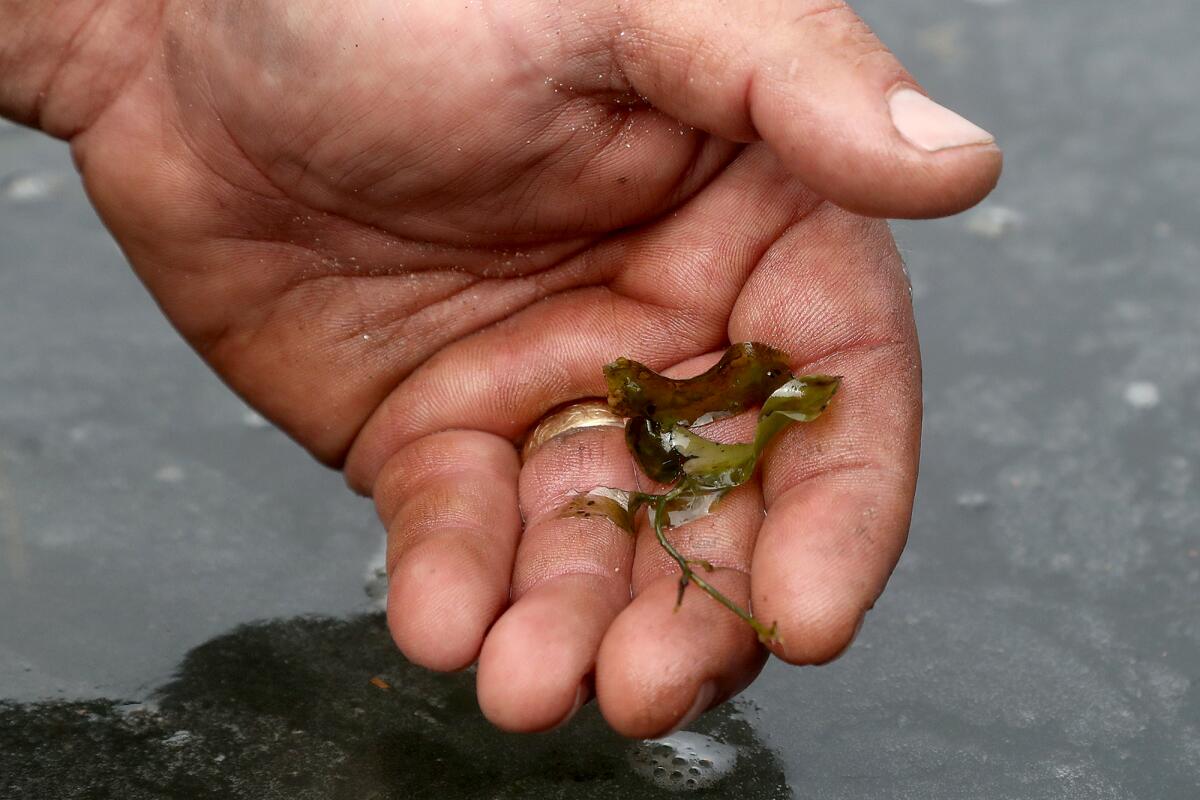State approves bill to ban sale, transport of Caulerpa algae

- Share via
A new bill prohibiting the sale, transport and possession of any species under the Caulerpa genus in California has just been signed into law late last month. The genus includes both Caulerpa taxifolia, which infested part of Huntington Beach and Carlsbad’s waters in the early 2000s, and Caulerpa prolifera, which has been battled in Newport Harbor in recent years.
The bill, AB655, was proposed by Assemblywoman Cottie Petrie-Norris (D-Irvine), who confirmed Thursday local environmentalist groups OC Coastkeeper and the California Coastkeeper Alliance reached out to her in January to partner on it.
“We want to thank Gov. [Gavin] Newsom for signing AB 655 into law,” said Sean Bothwell, executive director of California Coastkeeper Alliance in a statement announcing the bill’s passage. “Invasive species are a pervasive problem in California, but banning Caulerpa is a simple fix to a very serious and expensive problem.”
Prior existing law already prohibited the sale of some species of the genus, but the law Newsom signed in late July expands that to all saltwater Caulerpa plants.
The genus is a group of hardy green algae typically found in shallow tropical and subtropical waters that carries characteristics allowing for “great invasive potential,” according to the National Oceanic and Atmospheric Administration.
While the plant may not be harmful to humans, it can damage the native flora and fauna of California’s waters.
With the exception of scientific research, individuals who possess the algae without express permission from the state’s Fish and Wildlife Department face fines of $500 to $10,000 for each violation, according to the bill’s text.
OC Coastkeeper spokesman Matt Sylvester said AB655 builds off of the previous law, and the main thrust behind rallying for the bill to legislators was what happened in Newport Bay, which continues to face complete removal challenges.
In March 2021, a diver discovered the algae in China Cove and reported it to the Orange County Department of Agriculture and later the California Department of Fish and Wildlife. Divers attempted to remove much of the algae in July of that same year, but it continues to persist in part because of its asexual reproduction through fragmentation. The Southern California Caulerpa Action Team, which includes OC Coastkeeper, continues to survey the bay.
Petrie-Norris said she was “shocked and horrified” to hear that eradication of the 2000 infestation cost about $7 million and took six years, but not before serious damage to native eelgrass.
“I was really pleased to get that call from the governor’s office [about the bill’s approval]. AB655 is a really simple fix to a very serious threat to California’s coast. AB655 bans Caulerpa ... because it poses a serious risk to our coastal ecosystems. Getting this signed into law is a huge win for our coastal Orange County communities,” said Petrie-Norris.
Sylvester said parts of SCCAT’s team were faring well with acquiring funding but that OC Coastkeeper was uniquely positioned for communication. Legislation prohibiting Caulerpa has been a two- to three-year process, he said, but the organization is grateful for its passage.
“It’s an interesting issue because it’s not as grabby as an oil spill, let’s say. Oil, if left in the water long enough, will dissipate. But, if you leave a Caulerpa, it’s going to only get worse. That’s why we ended up having to be proactive with this,” Sylvester said. “There’s seepage from the ground after the last five to six decades [of oil drilling], but with Caulerpa — it’s really only us that causes the issue.
“With the bill, we can reduce the chances we have for someone to make that mistake and to keep it out of our waters for good.”
All the latest on Orange County from Orange County.
Get our free TimesOC newsletter.
You may occasionally receive promotional content from the Daily Pilot.




